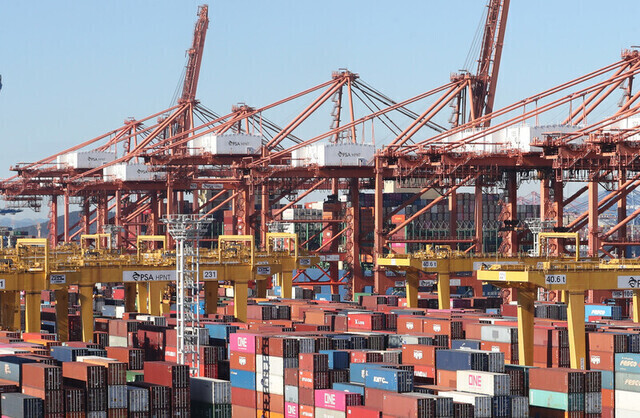







As South Korea enters 2025, the economy is bracing for a series of challenges that could hinder growth and stability. The Finance Ministry has sharply revised its GDP growth forecast for 2025 down to 1.8% from a previous estimate of 2.6%, marking a downgrade of 0.4 percentage points from July 2024 [ca502912]. This adjustment reflects concerns over weaker private consumption, easing export momentum, and global uncertainties, particularly with the potential return of Donald Trump to the White House, which has added to the unpredictability of international trade [ca502912]. The Bank of Korea (BOK) has also lowered its growth outlook by 0.1 percentage points, anticipating potential interest rate cuts in January 2025 [cd0821bd].
In a recent analysis, the Korea Capital Market Institute projected South Korea's economic growth rate at 1.6% for 2025, significantly lagging behind the U.S. expected growth of 2.5% [e7cf559a]. A survey conducted by the Korea Enterprises Federation (KEF) between January 6 and 17 revealed that 64% of economists expect prolonged stagnation, while 35% anticipate a slow recovery [400ad19f]. Additionally, 56% of respondents expressed pessimism regarding industrial competitiveness, and 83% believe that U.S. protectionism negatively impacts South Korea's export-dependent economy [400ad19f]. Deputy Minister Jang Bo-seong highlighted that risks from U.S. trade policies under the Trump administration could further lower South Korea's growth by 0.25 percentage points starting in 2026 [e7cf559a]. This divergence in growth rates raises concerns about South Korea's ability to retain investments, as the domestic stock market may face outflows as investors seek alternatives [e7cf559a].
In a recent report, South Korea's GDP increased by 0.1% in Q4 2024, unchanged from Q3 2024 but below the expected 0.2% growth [497f8e04]. Private consumption grew by 0.2%, driven by semi-durable goods and services, while government consumption increased by 0.5% [497f8e04]. However, construction investment fell by 3.2%, and exports rose by only 0.3%, indicating a sluggish economic environment [497f8e04]. The annual GDP growth for 2024 was reported at 2.0%, an improvement from 1.4% in 2023, but the current trends suggest a challenging path ahead [497f8e04].
In response to the economic slowdown, the South Korean government has announced a series of measures aimed at stimulating growth. Acting President Choi Sang-mok outlined a new economic policy on January 2, 2025, which includes temporary tax cuts on new vehicle purchases, reducing the Individual Consumption Tax from 5% to 3.5% [7421d06d]. Additionally, over 40% of the 85 trillion won ($64 billion) budget allocated for economic and welfare programs is set to be disbursed by March 2025 [7421d06d]. Consumers who increase their spending in the first half of 2025 will be eligible for a 20% income tax deduction, further incentivizing economic activity [7421d06d].
The BOK had previously projected a growth rate of 1.9% for 2025, which may further decline to 1.7% amid ongoing global trade tensions [7f7f7c09]. This outlook comes on the heels of a series of interest rate cuts aimed at stimulating the economy, with the BOK lowering its key policy rate to 3% in November 2024, marking the first consecutive cuts in 16 years [7f7f7c09].
The OECD has also downgraded South Korea's growth forecast to 2.1%, reflecting concerns over sluggish consumer spending and a declining current account surplus, which is expected to shrink from $90 billion to $80 billion [7f7f7c09]. In a more pessimistic view, Citibank forecasts Korea's growth at 1.6%, while other investment banks predict rates between 1.7% and 1.9% [2872a374]. Local business owners, such as 78-year-old Kim Jin-ha, a clothing shop owner in Seoul, report declining profits due to weak consumer demand, further complicating the economic landscape [7f7f7c09].
Exports are projected to grow by only 1.5% in 2025, a stark contrast to previous years, while the won-dollar exchange rate hovers around 1,450 won, increasing operational costs for major companies like Samsung and SK Hynix [7421d06d]. The BOK forecasts goods export growth to drop from 6.3% to 1.5%, and the Export Business Survey Index (EBSI) for Q1 2025 stands at 96.1, indicating worsening export conditions [2872a374]. The political turmoil surrounding President Yoon Suk Yeol's impeachment has exacerbated economic uncertainty, with the local stock market down 8% year-on-year [7f7f7c09].
The BOK's recent monetary policy decisions, including a surprise cut in November 2024, were made in response to weak domestic spending and declining exports, as well as uncertainties stemming from global economic conditions [7f7f7c09]. Governor Rhee Chang-yong emphasized that the bank would remain vigilant in monitoring the economic situation, particularly in light of the ongoing political unrest [7f7f7c09].
Despite the BOK's efforts to stabilize the economy, experts are calling for structural reforms and concentrated investments to maintain competitiveness in the face of these challenges [7f7f7c09]. Employment growth is also expected to decline from 170,000 to 120,000 jobs, indicating a tightening labor market [ca502912]. Critics warn that the government's measures may not adequately address the broader economic challenges posed by political instability [7421d06d]. The interplay between U.S. monetary policy and South Korea's economic conditions continues to create a precarious situation for investors and policymakers alike, necessitating careful navigation of both domestic and international economic factors [7f7f7c09].
As the new year approaches, the South Korean government is expected to implement measures aimed at improving market sentiment and addressing the economic headwinds that lie ahead. The focus will likely be on enhancing foreign exchange supply and stabilizing the financial market to ensure sufficient liquidity [7f7f7c09].
In summary, the road ahead for South Korea's economy in 2025 appears tough, with various factors contributing to a challenging environment that requires strategic responses from both the government and the private sector [7f7f7c09].